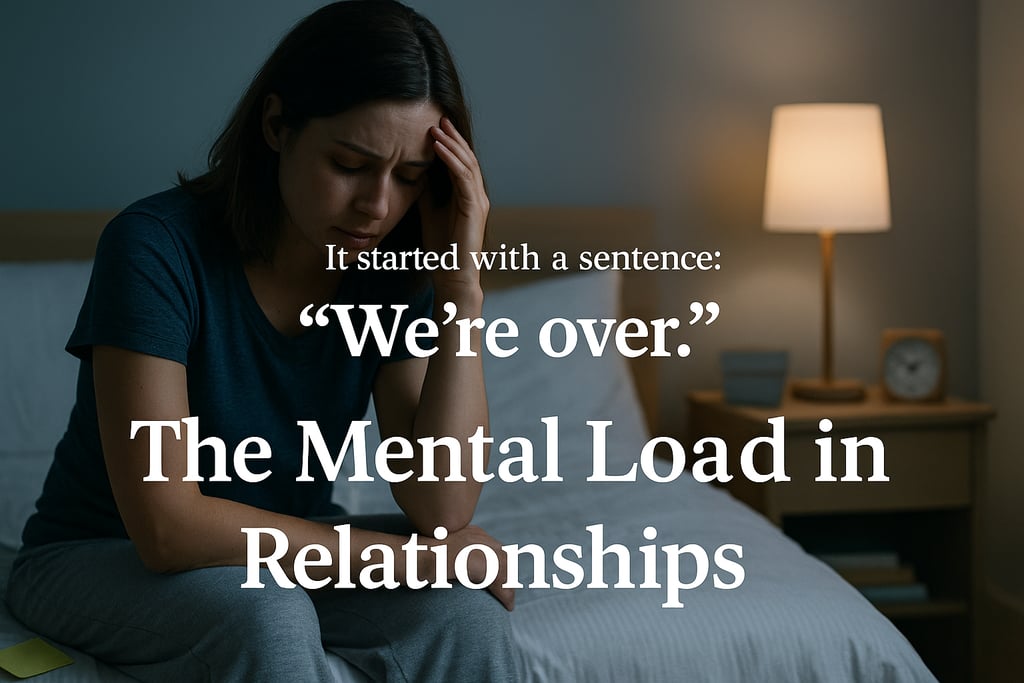Carrying the Mental Load in Relationships: Why It’s More Than Just Chores
Feeling emotionally overloaded in your relationship? Learn how counselling can help with the mental load, burnout, and balance at home.
MENTAL HEALTH
Garry Ebrey. Diploma Counselling. Accredited Counsellor.
7/8/20253 min read


Carrying the Mental Load in Relationships: Why It’s More Than Just Chores
It started with a sentence: “We’re over.”
Not because of betrayal or conflict, but because one partner had been silently overwhelmed by the invisible weight of carrying it all—the household, the schedules, the decisions, the worry. The mental load.
Many people—often women—shoulder this cognitive and emotional burden without even realising it. Until it becomes too much.
What Is the Mental Load?
The mental load refers to the behind-the-scenes planning, organising, remembering, and anticipating that keeps a home or family running. It’s the:
Keeping track of school activities
Remembering to book dentist appointments
Noticing when household items are running low
Managing social calendars
Planning meals and doing the food shop
Thinking through logistics
Even when chores are split equally, one person may still carry the mental responsibility for managing the entire system. That imbalance builds up quietly and emotionally drains the person holding it.
One Couple’s Wake-Up Call
In a recent story, a woman reached breaking point and told her husband she couldn’t carry their relationship alone anymore. To truly understand her exhaustion, they tried something bold: a week-long mental load swap.
Each partner took over the full cognitive and emotional responsibility the other usually held—meal planning, managing finances, school runs, pet care. What they discovered was eye-opening.
Even with full effort, the husband acknowledged his mental load remained lighter. She was still carrying the bulk of the emotional and organisational work.
This isn’t about blame. It’s about visibility. And fairness.
Why the Mental Load Matters
The hidden mental and emotional work affects well-being over time. It leads to:
Chronic stress
Resentment
Relationship tension
Burnout
Emotional disconnection
And often, the partner carrying more of the load feels invisible and unappreciated—not because their partner doesn’t care, but because they don’t see it.
Practical Ways to Create Balance
1. Try a Mental Load Swap
Even a few days of switching roles can reveal the unseen burdens and foster empathy.
2. Talk About the Load
Don’t just discuss what needs doing. Ask: Who’s thinking about this? Who’s managing it emotionally? That’s where the imbalance often lies.
3. Make the Invisible Visible
Use calendars, checklists, and shared tools. Bringing tasks out of your head and into shared space encourages mutual accountability.
4. Share the Emotional Load Too
Who’s worrying about the kids’ emotions? Who’s thinking about aging parents? Emotional labour matters just as much as practical help.
5. Avoid “Helping”—Be a Partner
Doing tasks when asked isn’t the same as proactively sharing the mental responsibility. Take ownership, not assignments.
How Counselling Can Help
Relationship counselling creates a safe, structured space to:
Talk openly about imbalance without blame
Explore why one partner may carry more of the mental and emotional weight
Learn better ways to communicate and share responsibilities
Reduce resentment and rebuild trust
Create practical plans for emotional and cognitive fairness
But it’s also important to acknowledge that relationship counselling doesn’t always work for everyone. Sometimes one partner isn’t ready—or it’s simply not the right space.
In these cases, one-to-one counselling can be incredibly powerful. It allows you to:
Explore your feelings without needing to filter or explain them to a partner
Build clarity and confidence in your own needs and boundaries
Recover from emotional burnout and overwhelm
Learn to communicate more clearly, even if your partner isn’t ready to engage
Whether you come as a couple or as an individual, counselling provides support, clarity, and space to make sense of the weight you’re carrying.
Talk openly about imbalance without blame
Explore why one partner may carry more of the mental and emotional weight
Learn better ways to communicate and share responsibilities
Reduce resentment and rebuild trust
Create practical plans for emotional and cognitive fairness
You don’t have to wait until things break. Counselling can help couples grow closer by making the invisible visible—and more equal.
About Me – Garry Ebrey
I’m a qualified, person-centred counsellor based in Maidstone. I work with individuals and couples navigating emotional overwhelm, relationship strain, burnout, and imbalance in shared responsibilities.
You deserve to feel heard, supported, and understood—whether you’re carrying too much or struggling to understand what your partner needs.
Let’s Talk
If the mental load is silently straining your relationship, I invite you to start a conversation.
📞 Call: 01622 232643
🌐 Website: www.garryebrey.com
Change starts with one honest conversation—and sometimes, that’s all it takes to shift the load.
